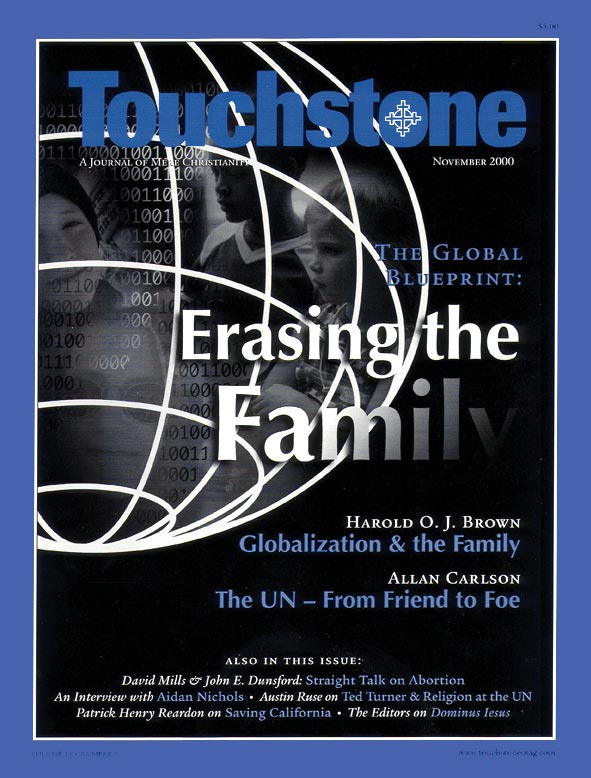Defending the Indefensible
David Mills on the Language of Abortion
In a recent column, George Will described how USA Today and the New York Times both refused to run a pointed but visually inoffensive ad against partial-birth abortion. Placed by Focus on the Family, the cartoon’s first four panels showed a baby being born, but the fifth showed him with his eyes closed and the caption, “Then he felt a sharp pain at the base of his skull! He jerked violently! And then . . . it was over!”
The Times thought the ad “too graphic,” said Focus on the Family, and Will noted that USA Today “must have considered the ad in poor taste,” since it was not fraudulent or libelous, the newspaper’s other two reasons for turning down an ad. “If that moving but mild ad is objectionable to USA Today and the Times, then they probably consider any criticism of partial-birth abortion unfit for public consumption. Such censorship—in the name of compassion protecting the public’s tender sensibilities—represents a novel understanding of the duties of journalistic institutions.”
Transforming Reality
I do not believe, any more than George Will seems to, that these papers truly found the ad objectionable. It is not plausible, given the ads they do run and the stories they publish. They were acting, as a pro-choice media has acted for some time, to keep the reality of abortion out of public discourse.
But there is another way to hide a reality from others, and that is to lie about it. The most effective lies do not deny the reality, because to deny it implies that it might exist. The most effective lies transform the reality into something else entirely.
Something in us makes us give good names to the bad things we want to do, after which the good names keep us from feeling guilty when we do the bad things. In C. S. Lewis’s “Screwtape Proposes a Toast,” the senior devil Screwtape explains to the graduates of the Tempters’ Training College how the competent devil uses language in his work of encouraging a human soul to damn himself.
The work begins, Screwtape says, when the subject’s “consciousness hardly exists apart from the atmosphere that surrounds [him],” so that he does not quite realize what he is doing when he sins. To take advantage of this ignorance, he tells the graduate devils, “We have contrived that their very language should be all smudge and blur; what would be a bribe in someone else’s profession is a tip or a present in theirs.”
The tempter must then work to turn these not quite conscious choices to sin into habits and these habits into principles, and again he does so by encouraging the subject to change his language. The unconscious desire to be like everyone else “now becomes an unacknowledged creed or ideal of Togetherness or Being like Folks. Mere ignorance of the law they break now turns into a vague theory about it—remember they know no history—a theory expressed by calling it conventional or puritan or bourgeois ‘morality.’”
We see people doing this sort of thing all the time, and most of us do it ourselves. In public life we see people doing it, not surprisingly, to the most vulnerable. People who would never hit a child or raise their voices even to a defiantly disobedient child, will speak of an unborn child as “tissue” or “the product of conception” or even more abstractly of “a woman’s right to control her own body,” in explaining why the “tissue” must be removed and the pregnancy (not the baby) “terminated.”
“Improving” the Race
Children with Down syndrome, for example, are being aborted at an increasing rate, and many people who want them to be aborted do not want to say so, and so use the language to hide the fact that what they want to do is kill retarded children before they are born, and therefore advance the practice. This was the horrifying point of a story by Tucker Carlson in The Weekly Standard a year or two ago, titled “Eugenics, American Style.”
Eugenics is the attempt to “improve” the human race by selective breeding and sometimes, as in the case of infants with Down syndrome, killing them before they are born. Seventy or eighty years ago many of the enlightened and progressive favored it. The feminist hero and founder of Planned Parenthood, Margaret Sanger, was a eugenicist, as were the great socialist wise man George Bernard Shaw and other leading humanitarians.
Many wanted to sterilize the poor and (as they thought them) unfit, so that there would, in time, be fewer poor unfit people and more people like them. (This strikes me, I must admit, and I am not being facetious, as a bad bargain.) Things were going nicely for the eugenicists until Hitler gave eugenics a bad name by being so good at it.
There is a problem of criteria, of course. As I wrote in these pages last year, the modern eugenicists really seem to think the value of a man’s life defined by his intelligence. The less intelligent are “defective” because: they are less intelligent.
In this case, since many Christians are demonstrably smarter than many of the eugenicists, on their own grounds we could rule their quality of life defective and do something about them. They, after all, set the standards. People near the top of a slippery slope rarely seem to realize how easily someone higher up can give them a push.
In another of Screwtape’s letters, by the way, he explains the demonic use of eugenics—and it is not the use you would expect, that it encourages men to kill other men for their own purposes. (Though Screwtape certainly approves of murder.) The vision of eugenics is one of those utopian promises that tie men, and especially the young, more firmly to this world, giving them time to become truly worldly.
“So inveterate is their [the young’s] appetite for Heaven,” wrote Screwtape, “that our best method, at this stage, of attaching them to Earth is to make them believe that Earth can be turned into Heaven at some future date by politics or eugenics or ‘science’ or psychology or what not. Real worldliness is a work of time—assisted, of course, by pride, for we teach them to describe the creeping death as Good Sense or Maturity or Experience.”
A language that smudges and blurs is a great help in this movement into real worldliness. And I have often heard pro-abortionists speak of the choice to “terminate the pregnancy” as an example of good sense or maturity or experience.
The Language of Abortion
The most vulnerable, of course, are the first victims of other people’s real worldliness. As Carlson explains, though “mildly to moderately retarded” (being not quite as bright as Forrest Gump), Down syndrome children can live at home, read, work, and live into late middle age.
Parents testify that such children are unusually loving and gentle and not as hard to raise as other people think. A charity that places these children for adoption never has fewer than 100 couples on its waiting list eager to adopt them.
Nevertheless, because they are expensive and troublesome and inconvenient, people do not want to have them, or for others to have them. Since the syndrome is usually discovered by amniocentesis, which is not performed till the sixteenth week of pregnancy, to abort the child requires tearing apart a fully formed human being, including some who are allowed almost to be born, and who could live were they born, whose skulls are crushed and their brains sucked out before the delivery is finished.
That is the reality. That is, for obvious reasons, the reality that must be hidden from sight.
Carlson began his article by reminding readers of the comments of soon-to-be Surgeon General Jocelyn Elders, who in 1990 claimed that abortion “has had an important and positive public-health effect” because it reduced “the number of children afflicted with severe defects.” She noted that “the number of Down syndrome infants in Washington state in 1976 was 64 percent lower than it would have been without legal abortion.”
Elders considers people who are not as smart as she is to be not just defective but severely defective, and killing them a benefit to the public health. One may think this morally deranged, but at least she said clearly and in public what she thinks.
Others—almost everyone else who shares her position—are not so honest. The Clinton administration argued that babies with “serious health problems” or a “serious fetal defect” should be exempted from the ban on partial-birth abortions. The abortionist it cited admitted that the most common “defect” he “treated”—“treated” by killing the child—was Down syndrome.
One doctor (one doctor) said that estimates of the high cost of raising a child with Down syndrome “provide a vivid picture of the value of research and prevention.” By which he meant preventing not the syndrome but the births of the children suffering from it.
Another doctor, who is actually the director of the Down Syndrome Center of Western Pennsylvania, said that aborting a Down syndrome child (he used the usual euphemism “terminating the pregnancy”) is not a “pro-life issue” but “a choice issue” and “an information issue.”
Yet another doctor, an obstetrician with whose words Carlson ended the article, said that he approves of eugenics—he favors eliminating “babies [sic] who don’t have much chance of a viable life”—though he dislikes the word. It has gotten “bad connotations over time. I think the better terms would be ‘genetic counseling’ and ‘prenatal diagnosis’ and ‘having a country in which the option to exercise choice in whether to continue or terminate a pregnancy is a right of the people.’”
All Evasions
These are all evasions of the plain and obvious facts of the matter. As George Orwell noted fifty years ago in his essay “Politics and the English Language,” “political speech and writing are largely the defense of the indefensible.” He may have been exaggerating, but not much.
In his world, fifty years ago, “Millions of peasants are robbed of their farms and sent trudging along the roads with no more than they can carry: this is called transfer of population or rectification of frontiers.” And perhaps more relevantly: “People are imprisoned for years without trial, or shot in the back of the neck or sent to die of scurvy in Arctic lumber camps: this is called elimination of unreliable elements.”
And in our world, killing the unborn because they will someday do badly on their SATs is called “treatment” or “prevention” or “a choice issue” or “genetic counseling” or “prenatal diagnosis.” What it is not called, except by indiscreet people like Ms. Elders (and remember that she was removed from office as quickly as her sex and color would allow), is killing a child before he is born because you think he will not live the sort of life he should and will cost too much to support.
These are lies, and our Lord said that Satan is the father of lies. As a friend, Louis Tarsitano, wrote me: “The worship of Satan requires human sacrifice because Satan, or any other creature, cannot make anything alive. To claim autonomous power, Satan and every other creature must kill. Satan and his children lie for a similar reason: they cannot make a truth.”
During the Civil War, he continued, “Nathan Bedford Forrest shocked his more cultured fellow Americans (Confederates and Federals alike) with his dictum, ‘War means fighting, and fighting means killing.’ His candor was considered uncouth. Cultural elites live by the euphemism that hides the nasty means to their right-thinking ends.
“This applies as much to our modern abortion elite as to any other. Even the word ‘eugenics’ is too blunt, since any slob with a dictionary can discover what it means. General Forrest might well have said in today’s America, ‘Abortion means choice, and choice means killing.’ How uncouth!”
It is not coincidental that the worship of Satan so often requires the sacrifice of small children. But even his worshippers cannot bring themselves to say this aloud, or in public, and so those who would kill children lie, by calling murder something else.
The author’s essay on C. S. Lewis, George Orwell, and ideological language appeared in the book he edited, The Pilgrim’s Guide: C. S. Lewis and the Art of Witness (Eerdmans).
“Screwtape Proposes a Toast” can be found in the 1996 Simon & Schuster edition of The Screwtape Letters and in The World’s Last Night and Other Essays (Harcourt Brace, 1984).
David Mills has been editor of Touchstone and executive editor of First Things.
subscription options
Order
Print/Online Subscription

Get six issues (one year) of Touchstone PLUS full online access including pdf downloads for only $39.95. That's only $3.34 per month!
Order
Online Only
Subscription

Get a one-year full-access subscription to the Touchstone online archives for only $19.95. That's only $1.66 per month!
bulk subscriptions
Order Touchstone subscriptions in bulk and save $10 per sub! Each subscription includes 6 issues of Touchstone plus full online access to touchstonemag.com—including archives, videos, and pdf downloads of recent issues for only $29.95 each! Great for churches or study groups.
Transactions will be processed on a secure server.
more on abortion from the online archives
more from the online archives
calling all readers
Please Donate
"There are magazines worth reading but few worth saving . . . Touchstone is just such a magazine."
—Alice von Hildebrand
"Here we do not concede one square millimeter of territory to falsehood, folly, contemporary sentimentality, or fashion. We speak the truth, and let God be our judge. . . . Touchstone is the one committedly Christian conservative journal."
—Anthony Esolen, Touchstone senior editor












